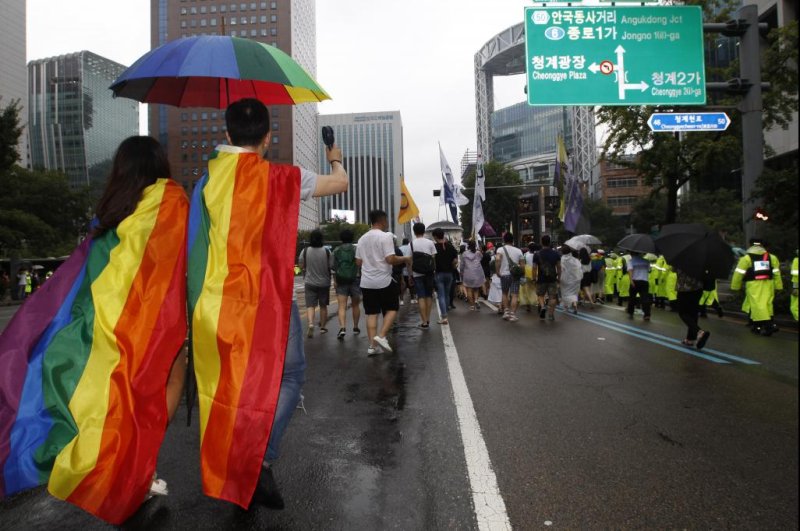Participants gather at the annual South Korean Queer Culture Festival in Seoul in July 2017. LGBT activists in the country have been encouraged by progress on marriage equality overseas. File Photo by Kim Chul-soo/EPA
SEOUL, Feb. 11 (UPI) -- South Korea's lesbian, gay, bisexual and transgender community is hungry for recognition and is encouraged by the progress countries like Taiwan and the United States have made on marriage equality, local activists said Sunday.
At the 10th annual sexual minorities human rights forum at South Korea's Yonsei University, Jang Seo-hyeon, an attorney with GongGam Human Rights Law Foundation, said a recent survey indicated 86 percent of South Koreans in the LGBT community seek the right to a legally recognized marriage.
Hopes of gaining marriage equality are running high in the country hosting the 2018 Pyeongchang Winter Olympics, despite a landmark ruling from a Seoul court in 2016 that banned a notable filmmaker, Kim Jho Kwang-soo, and his longtime partner Kim Seung-hwan, from entering a legally recognized same-sex union.
Activists like Jang, and the Kims' attorney Ryu Min-hee, are no strangers to opposition.
Ryu, who was at the forum on Sunday, said the recognition of same-sex partnerships as marriage is crucial for South Korea's LGBT community.
Queer people across the country are already in long-term partnerships, the human rights attorney said, citing the example of two South Korean women in Busan who made news after they tragically took their own lives in their apartment in 2013, having lived together as "roommates" for 20 years.
Local press reports issued at the time make no mention of their sexual orientation. They described one of the women as a terminal cancer patient -- her diagnosis was reportedly the cause of suicide.
Ryu said their lifestyle indicated a same-sex partnership that was also not a legally recognized union.
Other panelists at the forum criticized South Korea's insular education policy, and targeted a set of standards on sex education in schools, first introduced in 2015 by Seoul's education ministry.
The guidelines do not instruct students on sexual minorities or build awareness of LGBT concerns. They only reinforce harmful stereotypes, the presenters said.
Lee Shin-ae, an activist with an organization that investigates gender equality in South Korean schools, said the sex education guidelines are problematic and point to a larger social problem in South Korea regarding the construction of gender.
The guidelines to South Korean educators encourage them to promote the heterosexual nuclear family as the paragon of "normalcy," and stigmatize students who come from single-parent households, Lee said.
"Teachers are advised to say things like, 'A household without a father, how sad would that be?'" the activist said.
Lee also said the education guidelines portray women as having a weak sex drive and mislead young people about the difficulties of childbirth.
Sex education about pregnancy focuses on the fetus and the "miracle" of new life, steering the conversation away from a woman's point of view about the pain that comes with bearing a child, she said.
The stigma of being openly gay in public was also a concern among queer labor activists, who on a separate panel addressed the delicate matter of disclosing sexual orientation at work.
The South Korean workplace poses difficulties for queer people, who do not wish to be labeled as "different," said one LGBT activist who spoke under the pseudonym "Isabel."
"Most people surveyed say they are not afraid of being dismissed after identified as gay," he said. "They are afraid things will become awkward with colleagues if they come out of the closet."
Na Young, an activist with the Network for Glocal Activism, said the larger social emphasis on "family structure," and "expectations regarding gender roles, beyond the woman as child bearer," create income inequality and a stigma for South Koreans who are "unmarried, not family oriented."
"These people are singled out," Na said.
The activists took inspiration from recent examples of progress in LGBT rights abroad, in the United States, Australia, but most importantly in Taiwan, where the country's top court ruled in favor of same-sex marriages.
Organizers said "Korea is next," when it comes to recognition of same-sex marriages.
Although Taiwan's top court ruled in favor of same-sex marriage, bills required for legalization are still pending.
That means in Asia "Korea could also be first" in marriage equality if society makes progress, they said.















